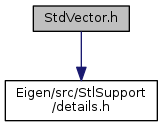#include "Eigen/src/StlSupport/details.h"
Include dependency graph for StdVector.h:

Go to the source code of this file.
Classes | |
| class | std::vector< T, EIGEN_ALIGNED_ALLOCATOR< T > > |
Namespaces | |
| std | |
Macros | |
| #define | EIGEN_DEFINE_STL_VECTOR_SPECIALIZATION(...) |
| #define | EIGEN_STD_VECTOR_SPECIALIZATION_BODY |
Macro Definition Documentation
| #define EIGEN_DEFINE_STL_VECTOR_SPECIALIZATION | ( | ... | ) |
Value:
namespace std \
{ \
template<> \
class vector<__VA_ARGS__, std::allocator<__VA_ARGS__> > \
: public vector<__VA_ARGS__, EIGEN_ALIGNED_ALLOCATOR<__VA_ARGS__> > \
{ \
typedef vector<__VA_ARGS__, EIGEN_ALIGNED_ALLOCATOR<__VA_ARGS__> > vector_base; \
public: \
typedef __VA_ARGS__ value_type; \
typedef vector_base::allocator_type allocator_type; \
typedef vector_base::size_type size_type; \
typedef vector_base::iterator iterator; \
explicit vector(const allocator_type& a = allocator_type()) : vector_base(a) {} \
template<typename InputIterator> \
vector(InputIterator first, InputIterator last, const allocator_type& a = allocator_type()) : vector_base(first, last, a) {} \
vector(const vector& c) : vector_base(c) {} \
explicit vector(size_type num, const value_type& val = value_type()) : vector_base(num, val) {} \
vector(iterator start, iterator end) : vector_base(start, end) {} \
vector& operator=(const vector& x) { \
vector_base::operator=(x); \
return *this; \
} \
}; \
}
This section contains a convenience MACRO which allows an easy specialization of std::vector such that for data types with alignment issues the correct allocator is used automatically.
Definition at line 21 of file StdVector.h.
| #define EIGEN_STD_VECTOR_SPECIALIZATION_BODY |
Value:
public: \
typedef T value_type; \
typedef typename vector_base::allocator_type allocator_type; \
typedef typename vector_base::size_type size_type; \
typedef typename vector_base::iterator iterator; \
typedef typename vector_base::const_iterator const_iterator; \
explicit vector(const allocator_type& a = allocator_type()) : vector_base(a) {} \
template<typename InputIterator> \
vector(InputIterator first, InputIterator last, const allocator_type& a = allocator_type()) \
: vector_base(first, last, a) {} \
vector(const vector& c) : vector_base(c) {} \
explicit vector(size_type num, const value_type& val = value_type()) : vector_base(num, val) {} \
vector(iterator start, iterator end) : vector_base(start, end) {} \
vector& operator=(const vector& x) { \
vector_base::operator=(x); \
return *this; \
}
Definition at line 49 of file StdVector.h.